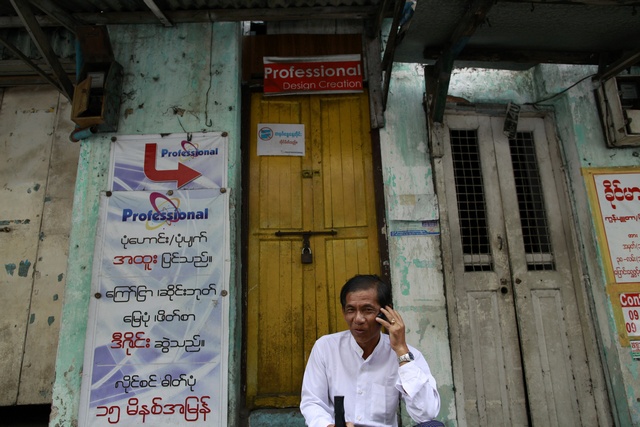Burma awarded two highly anticipated telecommunications licences to Telenor and Ooreedo on Thursday, despite calls from the lower house of parliament to delay the process until the country has passed a law to govern the sector.
Both companies have been awarded 15-year operating and spectrum licences and will be required to support the government’s ambitious strategy to cover 50 percent of the country with mobile internet services in five years.
They will need to invest billions of dollars to expand telecommunications networks across the impoverished country, where less than ten percent of the population have access to a phone.
The Qatari-based Ooreedo has already pledged to invest US$15 billion into rolling out a telecoms network in Burma, promising to reach 90% of the population within two years. Meanwhile, Norway’s Telenor has promised to pump US$3 billion into Burma’s telecoms infrastructure, as well as boost local employment opportunities.
The two companies squeezed out nine other shortlisted bidders and will be required to launch services within nine months of receiving the licences, which is expected to be in September.
The announcement formally ends speculation that the government might delay the tender, after the lower house of parliament on Wednesday sought to suspend the bidding process until a new telecommunications law, which is currently stuck in parliament, is finalised.
But earlier today a government spokesperson told DVB that it was too late for parliament to delay the process. The president’s office also issued a statement insisting that the tender process was in accordance with existing laws and warned that a delay would harm the country’s image.
“Should the [tender] be suspended due to the objections of the lower house, it would be harmful to our country’s credibility at a time when we are just beginning to gain momentum for economic development,” said the statement.
Burma is lagging far behind its neighbours in mobile phone coverage and the price of SIM cards still averages around US$200. However, the absence of a clear regulatory framework for the telecoms industry has raised concerns among both industry players and human rights activists.
In May, Human Rights Watch warned that telecoms operators looking to invest in the former pariah state risk complicity in state surveillance and censorship mechanisms that are sanctioned under existing laws.
According to the rights group, a draft version of the new telecoms law seen in March still contains “troubling provisions” that provide limited safeguards against government abuse. The UK mobile phone giant, Vodafone, subsequently pulled out of the race over concerns about Burma’s weak legal system.
Burma’s telecommunications industry is currently regulated by the state-owned Myanmar Post and Telecommunications (MPT), which also has significant commercial stakes in the sector and currently dominates the mobile phone market.
Analysts say the regulatory process lacks both transparency and accountability and have warned that MPT’s financial stake represents a clear conflict of interest. The government does not plan to appoint a new regulator until 2015.
Two other domestic firms, including the state-owned Yatanarpon and the tax-exempt, military-owned Myanmar Economic Corporation (MEC), also control a chunk of the market. Both Telenor and Ooredoo will have to compete with the incumbents, who are already planning commercial partnerships to expand their networks.
Burma has outlined a bold strategy to cover 25 percent of the population with telephone services within a year, and 75 percent by 2018. Currently, less than one in ten people own a mobile phone or have access to the internet. Burma is often described as the world’s last untapped telecoms market.



